The Lowe Down 7
Guest Column:

By Pam Lowe

The Lowe Down 7

By Pam Lowe
Historically, the recipient of the Headliner of the Year Award, presented by the Arkansas Press Association for bringing good headlines to the state over the past year, has been an individual newsmaker. Only twice before has an entity received the honor.
This year the Arkansas Foodbank, one of the leading non-profit organizations in the state, will join Heifer International of Little Rock and Murphy Oil of El Dorado in that special group of headliners.
The honor will be bestowed at the third annual Press Freedom Gala, Thursday, Oct. 24, at the Clinton Presidential Center’s Great Hall. The event will begin with a reception at 6 p.m., followed by the awards ceremony at 7 p.m.
Celebrating its 40th anniversary this year, the Arkansas Foodbank is the state’s largest hunger relief organization, serving 33 counties in central, eastern and southern parts of the state. Through a network of 320 partner agencies, the Foodbank distributes more than 42 million pounds of food annually to some 200,000 Arkansans.
“I was stunned when I heard about this award,” said Arkansas Foodbank Chief Executive Officer Brian Burton. “As I learned of
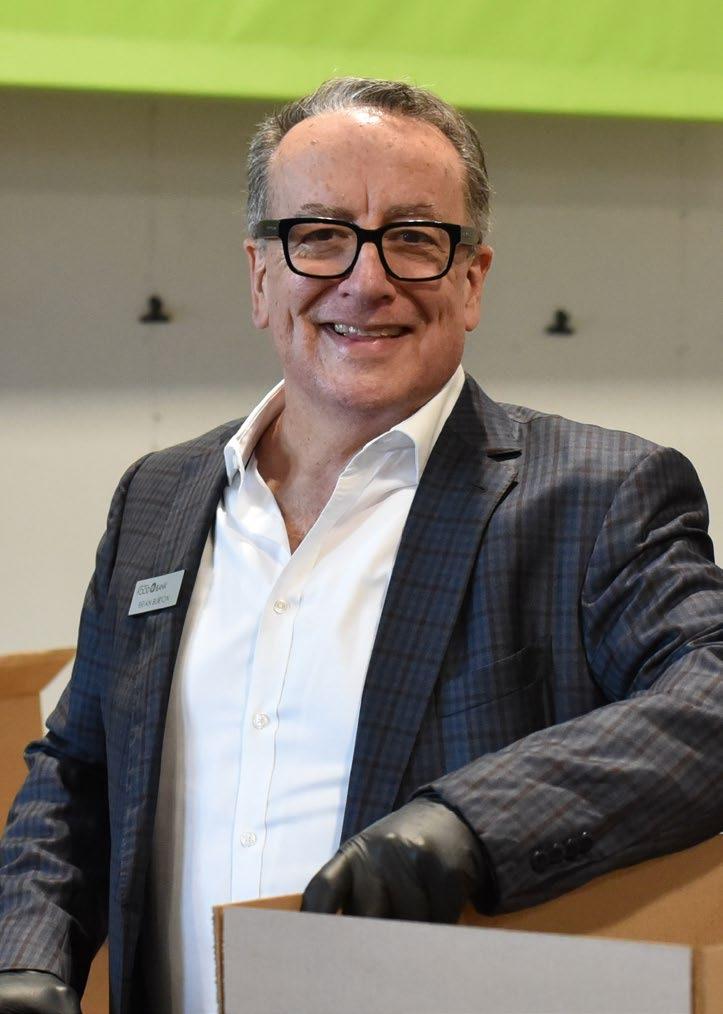
the company we were joining – the roll call of past recipients – I was moved beyond words.
“The recognition is a tribute to the founders and sustainers who built an enduring asset --- one that demonstrates the convergence of the compassion, generosity, humanity and enterprising spirit of our people. The award boosts our collective resolve for every person to have access to the nutritious food they need to lead a productive and meaningful life.”
Burton’s business background is critical to the operation of the Foodbank, which has an annual budget of $15 million, employs 80 and works with some 13,000 volunteers. Offices and distribution facilities are located at 4301 West 65th Street in southwest Little Rock.
The Foodbank is funded through donations from individuals, businesses and foundations and receives grants and other assistance from federal, state and local agencies. It is one of six Feeding America food banks in Arkansas, with smaller outlets Vol.19 | No. 41 | Thursday, October 17, 2024 |
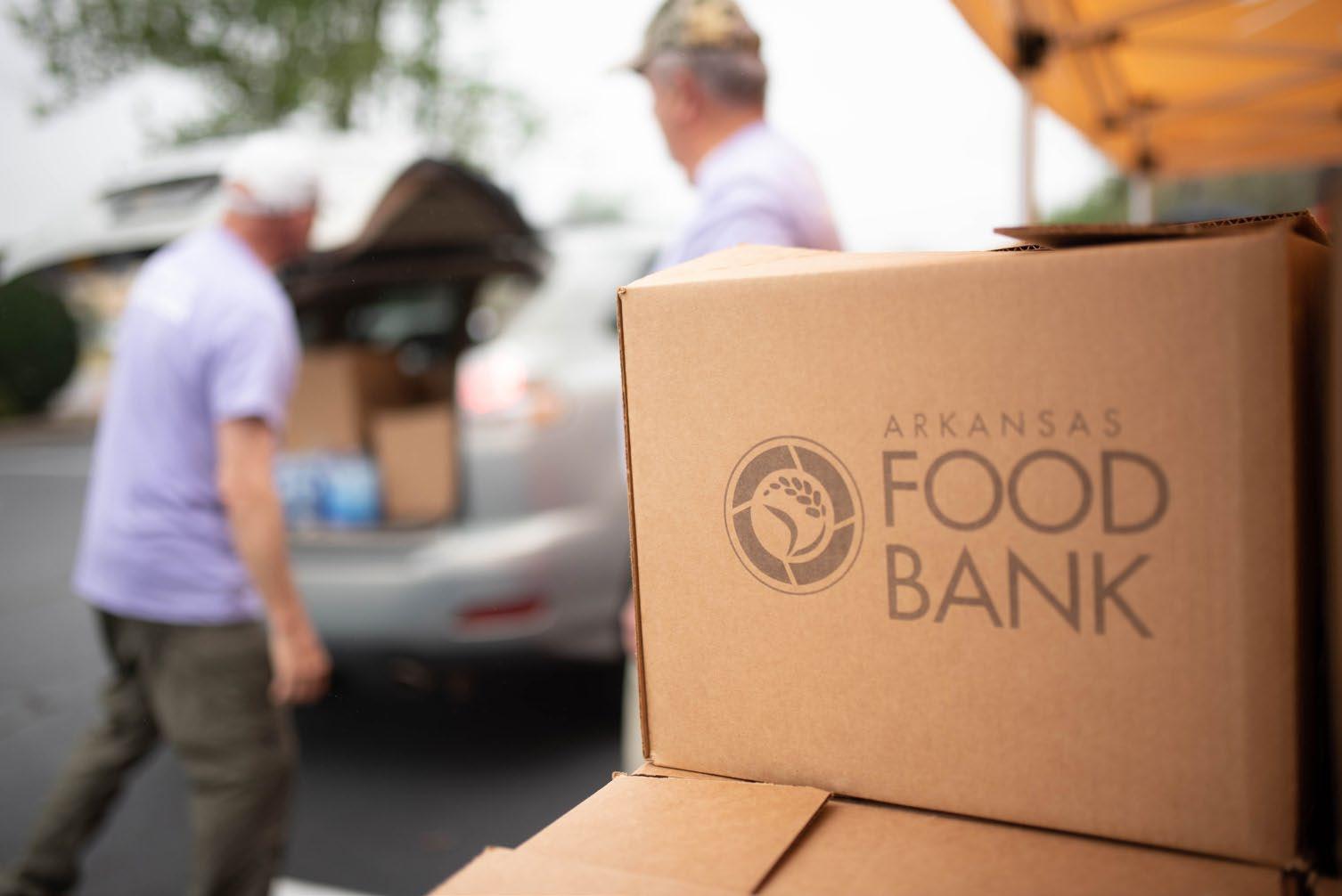
Continued from page 1
located in Lowell, Fort Smith, Mountain Home, Jonesboro and Texarkana. Burton explains that his organization works with the other foodbanks to find areas of synergy in meeting the needs of the hungry in Arkansas.
Burton praises the input of his 23-person board of directors. “They bring talent, strategy and resources to the organization. They are the glue that builds our reputation in the community.
“Good boards usually have some outstanding business people who provide cool wisdom and keep the organization from drifting away from its mission. They provide what you might call peer review that leads to checks and balances.”
In addition to the monetary donations and grants, a critical part of the operation involves food donations from farmers, grocery stores and government commodity sources. Burton said major categories are fresh produce, meat and dairy products. Rice was a big part of September food distribution, in line with the local harvest. Arkansas is the largest rice-producing state in the nation.
Burton is especially proud of the volunteer force, which equates to 22 fulltime employees. The level of participation is so strong that a special volunteer wing was added to the headquarters and an additional parking lot is currently being developed. Volunteers are especially helpful in organizing and packaging donated food items. A big part of the effort is filling backpacks with weekend food for some 3,000 disadvantaged students each Friday.
that the organization is operated with sound business practices. “We are getting better and better each day, and we are constantly trying to innovate. We take that role seriously and we do it joyfully.”
The challenge faced by food banks in the state is daunting. Sadly, Arkansas ranks as the worst state in the nation in terms of the number of citizens experiencing food insecurity. One in five Arkansans is facing hunger and one in four children is at risk for going hungry.
Burton certainly sees the effects of that in his service area, not only in urban areas of Little Rock, but throughout rural parts of eastern and southern Arkansas.

“We see a lot of poverty that didn’t start yesterday,” Burton said. “In the small rural towns, there is no shortage of pride, and they have assets and strengths. We like to accentuate that and provide support to help low and moderateincome residents. We are often important purveyors of hope.
“This is ultimately a solvable problem. It is a function of resources and our ability to effectively and equitably spread those resources across the region.”
Burton was eminently qualified to take over the operation of the Arkansas Foodbank, based on his background over many years of working in faith, business and philanthropic endeavors. And the timing was perfect.
“Children as young as 10 years old can participate in our volunteer program, and we provide excellent management,” Burton said. “Our volunteers are our pride and joy.”
Volunteers also can play a key role in organizing food drives throughout the service area.
Burton said the holiday season is an excellent time to make monetary donations to the Arkansas Foodbank since it is a critical period of need for hungry families. In fact, Dec. 19 has been designated as a special day, since a major donor has agreed to match any donations made then. Burton is proud of the fact that 96 cents of every dollar donated goes directly to meet hunger needs. “That is a really high percentage for a non-profit,” he said. Because of synergies that have been developed, a $1 donation can result in five meals for a hungry Arkansan.
Burton, who has been on the job here since October 2022, stresses
A native of Little Rock, he graduated from Hall High School before earning a bachelor’s degree in business and accounting from Ouachita Baptist University in Arkadelphia. He then earned an MBA from Louisiana State University.
After working as a controller at Centex Homes in the Dallas area, he went on to earn a Master of Divinity from the Southern Baptist Theological Seminary in Louisville. That led to five years as an associate pastor at Wilshire Baptist Church in Dallas.
Burton became increasingly involved with outreach into the community while at the church, ultimately leading to his accepting a position as director of a large food pantry in the Dallas area. “I’m not sure I understood what I was getting into,” he said with a laugh.
The fact is that Burton was in a period when he increasingly came to understand the needs of the poor in our society.
“I was learning about generational poverty,” he said. He was not really attuned to those problems when growing up in Little Rock,
Continued from page 2
but that changed as his career path developed.
“I got rid of those stereotypes and fake stigmas that were in my mind over the years,” he said. “I just saw how real these people were, while working against great odds. I do think there was value in my business background, because I learned not to coddle, but by bringing something that would give them hope.
“I learned how daunting it is for people to get out of poverty because there are so many forces that sabotage that journey for them. And I saw how powerful and transformational a foodbank could be in the community.”
After 15 years in his position at Dallas, Burton took the giant leap to become director of Three Square, a major food bank in Las Vegas. He was somewhat apprehensive about the move, but immediately saw it was a good fit on both sides. “I never saw a decision made so quickly,” he said.
Burton remained at the Las Vegas position for 11 years (“I called it my Lewis and Clark Adventure”) until the great opportunity arose for him to “come home” to Central Arkansas two years ago.
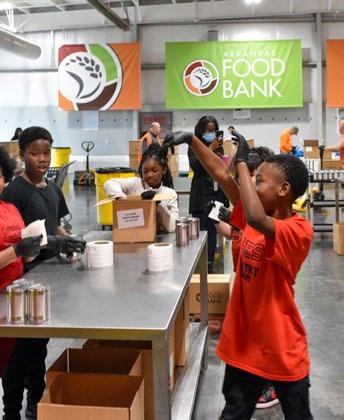
Burton remains committed and excited about the task at hand. “It is amazing to be in a position where you are involved with the full economic strata of our society – praying with a homeless person and then meeting with a billionaire about support.
to participate in the programs,” he said. He contends the tighter guidelines are a “willful choice” in Arkansas and believes it makes no sense, since the programs are federally funded.
For example, Burton said upwards of 100 percent of eligible participants are receiving the appropriate food benefits in the state of Oregon, resulting in millions of dollars of assistance and cash inflow into that state.
More participation means more economic activity for grocery stores throughout the state, many in small towns that really appreciate the business. He said studies show that $1 spent locally through SNAP (formerly known as food stamps), generates $1.80 for the community.
“If you are not motivated by compassion, at least be motivated by economic self-interest,” Burton said.

“This position is just not common in life. But through it I can see common patterns and thinking that all people share. I have a much greater appreciation that most of us want the same things in life. It is very rewarding and illuminating.”
In addition to his direct work at the Foodbank, Burton is involved in advocacy for the working poor and those experiencing food insecurity.
One aspect of that effort is frustrating for him. He recognizes that a painfully small number of Arkansans are receiving food and other assistance from the federal Supplemental Nutrition Assistance Program (SNAP) and Women, Infants, and Children (WIC).
He and others are working with state legislators to loosen regulations that enable the poor to qualify for such programs. He notes that, nationwide, the overwhelming amount of food assistance comes through such programs – while foodbanks basically provide supplemental support.
“We are sending tax money to Washington that is going to states that have guidelines that are more inclusive, allowing people
He said progress was made on the issue in the latest General Assembly and hopes to reach more legislators on this issue in the next session.
Burton is happy to be back in Arkansas and enjoying seeing people he grew up with. His family lived in the Leawood neighborhood, which was then on the west edge of Little Rock.
His father, the late Dr. Glenn Burton, practiced dentistry in the Town and Country Shopping Center for 40 years before passing away in 2002. His mother, the former Kathleen Jolly of Jonesboro, was the first female chairman of the board of trustees at Ouachita Baptist University. She died in 2018.
He has three siblings – Allen Burton, a professor at the University of Michigan in Ann Arbor; Mark Burton, a retired engineer who lives in the Dallas area, and Sara Deats, who is director of a recreational center in Plano, Texas.
Burton enjoys bird watching, trees, writing, genealogy, travel and spending time with his little dog, Lucy, a Jack Russell/basset hound mix that he adopted in Las Vegas.
He looks forward to continuing and expanding the mission of the Arkansas Foodbank, adding that there has indeed been personal satisfaction in the work he has been doing to address food insecurity in our society.
“Satisfaction from this work is real, lasting and feeds my courage,” he said. Humanizing the working poor and folks who struggle on the ragged rim of our economy is huge. The joy I feel in moving from success to significance in my own life work fuels me to continually draw new people into this work who are searching for
Continued from page 3
meaning and purpose in their work.
“And the opportunity to tell the stories of people who are overlooked or minimized, and then to behold the reaction of advantaged individuals as their stereotypes crumble. They must rethink the boxes they have built around them, which gives me immense pleasure and a defiant hope.”
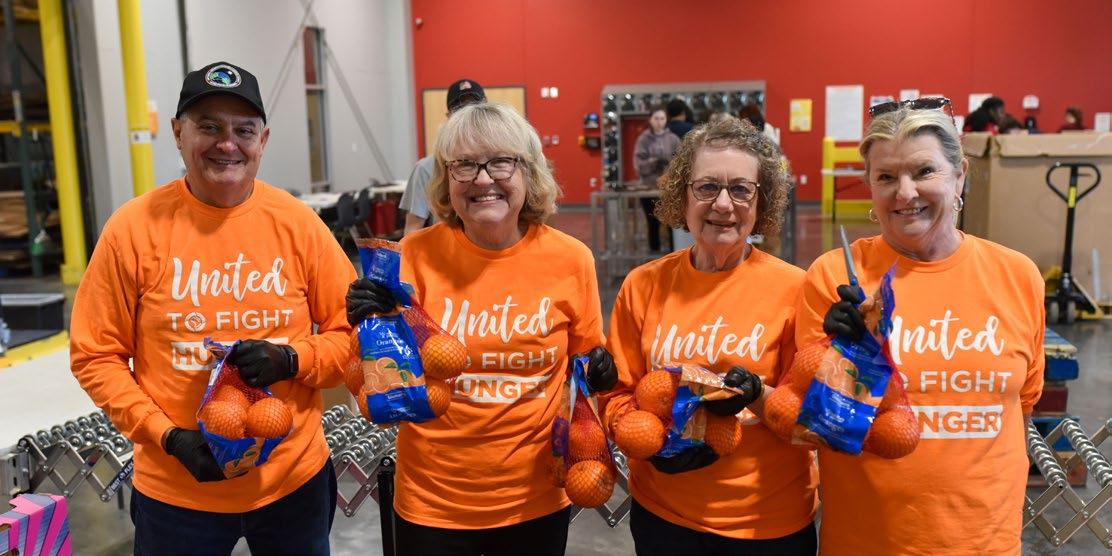

Registration is now underway for the 2024 ArkLaMiss Circulation, Marketing & Audience Development Conference, hosted jointly by APA and the Mississippi Press Association and planned for Nov. 7-8 at the Ameristar Vicksburg Casino Hotel.
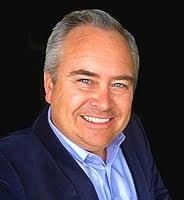
Leading sales and marketing trainer and motivational speaker Ryan Dohrn will serve as this year’s keynote presenter and will present sessions focused on marketing
your publications, customer service and more.
The annual conference runs from noon on Thursday, November 7, through 11:15 the following morning. Register online at https:// mspress.regfox.com/ arklamiss-conference
For hotel room reservations at the special room block rate of $89 per night, call 601-638-1000 and reference code 1107ARKLAMISS by Friday, Oct. 25.

Although a number have responded to the call for volunteer judges to review submissions from more than 60 newspapers in the Kentucky Press Association Better Newspaper Editorial Contest, more are needed.
Categories to be judged include News Writing, News Columns, Feature Writing, Editorial and Opinion, Sports Writing, Best Lede, Sport Photos, News or Feature Photos, Best Video, Social Media and Best Website and more. Newspaper employees from all departments are encouraged to sign up.
Judges will work online, at their own pace, beginning in early November. All judging will be completed before the week of Thanksgiving.
Please volunteer by Thursday, Oct. 31 by filling out the secure form at https://forms. gle/Leyxp1RX8ax96bPEA. If you have any questions, email Terri Cobb at terri@ arknasaspress.org or call (501) 374-1500.

Jessie Elizabeth Christner Bain of Hot Springs died Sept. 30, 2024. She was 99.
A native of Flint, Michigan, she was born in 1925 to Carl and Josephine Wood Christner, and married to Rural Cleveland “RC” Bain. She was retired from The Sentinel-Record in Hot Springs, where she worked for many years in the advertising department.
Bain was active at Grace Apostolic Church, where she was a founding member, a trustee, a Sunday school teacher, the building fund bookkeeper, a church librarian, a member of the Grace Academy School Board and a teacher. An awardwinning photographer, Bain was also a member of the Business and Professional Woman’s Club.
In addition to her husband and parents, Bain was predeceased by her son-in-law Phillip Bailey and grandson Douglas Bailey. She is survived by daughters Jeanne Maddox Bailey and Peggy Bain Daley (Don), two grandchildren and four great-grandchildren.
Travis Simpson, editor of The Courier in Russellville, won silver in the Young Adult General category at the 2024 Moonbeam Children’s Book Awards for “Strong Like You,” his debut young adult novel published earlier this year.
“Strong Like You” looks at the legacy and impact of violence, especially around the toxic culture of football, with a compassionate view of the struggle and frequent hopelessness of rural poverty.
Publishing services company Jenkins Group and IndependentPublisher.com created the Moonbeam contest in 2006 as a way to open up awards in children’s publishing to all types of publishers and genres.
Award winners include not only longestablished publishers and university presses, but also small presses, foundations, museums and self-published entrepreneurs.

The River Valley Democrat-Gazette, a Sunday newspaper covering Fort Smith and the Arkansas River Valley area, has applied for full membership to the Arkansas Press Association. The APA Constitution and Bylaws require three notifications of the application to APA membership. This is the second of those three notifications.
The River Valley Democrat-Gazette is owned by WEHCO Media, Inc. and published by Eliza Gaines. Brent A. Powers is president,
Dave Perozek is managing editor and Randall Seyer is the editor. It was first published in July 2021, and having now been published weekly for more than two years is eligible for full APA membership.
Any APA member who objects to the River Valley Democrat-Gazette’s membership in APA may provide a written letter of objection to Executive Director Ashley Kemp Wimberley, 411 S. Victory St., Little Rock AR 72201.


Missouri Southern State University Professor of Communications Chad Stebbins has been selected as Missouri Press Association’s next executive director.
Stebbins will officially join MPA in January of next year, and succeeds Mark Maassen,
who is retiring in February.
Stebbins is also the director of the Institute of International Studies at MSSU. He has served as executive director of the International Society of Weekly Newspaper Editors since 1999.
“Chad represents an excellent opportunity for the Missouri Press Association to continue the important work of relationship building with our members, as well as with legislators in Jefferson City and with journalism educators across the state,” Chair of the Executive Director Search Committee and MPA President-elect Peggy Scott said.
“His experience within national and international press organizations will provide more opportunities and partnerships for Missouri’s newspapers to gain and share knowledge so they can continue to serve their communities.”
Stebbins holds a bachelor’s degree in business administration from MSSU.
He earned his master’s degree in mass communication from University of Central Missouri and a doctorate in mass communication from Bowling Green State University. He was advisor for MSSU’s student newspaper, The Chart, for 15 years.
In addition to serving as executive director of ISWNE, he is a member of Newspaper Association Managers, Newton County Extension Council, the Joplin History & Mineral Museum, the Joplin Historical Society and the Joplin Celebrations Commission.
Stebbins received the Walter Williams Award from the Missouri Writers Guild in 2022 for his 2021 book, “Joplin’s Connor Hotel,” published by The History Press. “All the News Is Fit to Print: Profile of a Country Editor,” his biography of longtime editor and publisher of the Lamar Democrat Arthur Aull, was published by the University of Missouri Press in 1998.
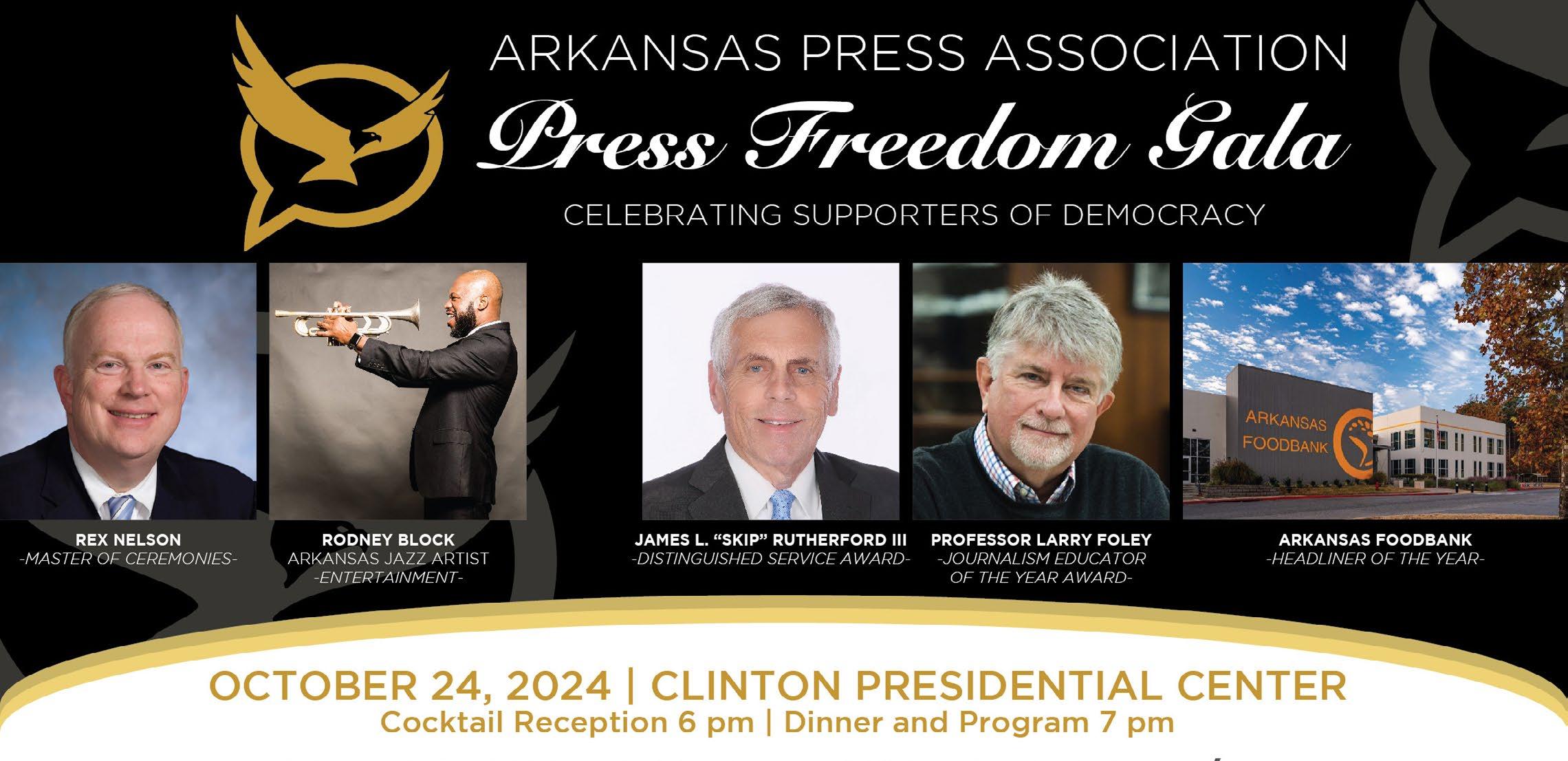
The Arkansas Newspaper Connection is a weekly newsletter published by APA connecting freelance and independent writers, editors, photographers and designers with Arkansas newspapers in need. Lists available job openings and other opportunities at Arkansas newspapers and associate member organizations. Send your listings to info@arkansaspress.org.
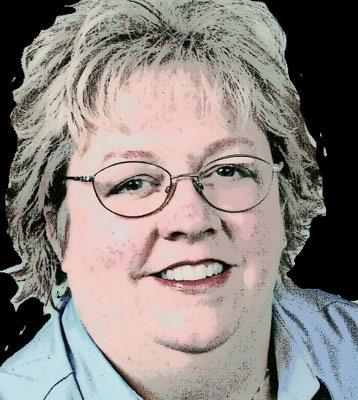


With every issue of a newspaper that editors publish, the thought of the community that the publication serves resides in the forefront of their minds.It’s the reason for their dedication and commitment to the work.
If you’re reading this, you understand the importance of a local newspaper and we thank you. It’s easy for people to take for granted the importance of a newspaper in their community these days.
This year the theme for National Newspaper Week was “Telling Our Stories,” and editors, publishers and journalists were encouraged to share their stories about their newspaper journeys and the impact their newspaper has had on their region.
There are many stories and articles that I’ve published throughout my years as editor of the Clay County Courier that make me proud. I’ve always felt that while reporting events that have happened is very important, equally essential to a community, is researching and investigating issues that are valuable to our readers. Bringing experts on a topic of concern to a community through the local newspaper provides a front row seat to personalized information readers cannot receive elsewhere.
Whether it is an interview with the CEO of the Arkansas Rural Water Association or the President of the Arkansas Plant Board, the local newspaper has the power to bring experts into the homes of local residents.
In honor of National Newspaper Week, I’m sharing the work and the impact our local small town newspaper had on our community in 2020 during the pandemic.
When the world turned upside down while COVID-19 wreaked havoc within every community, the Courier was there to support Clay County residents with information. We didn’t sit back and just
By Pam Lowe
report on the pandemic. We actively sought out vital information in order to protect our community as best we could. We were literally working to help people remain healthy and more importantly, alive.
The following are just a few of the measures that were taken to help residents in our small county make knowledgeable decisions about their health and the health of their families.
The first article in the Courier concerning COVID-19 was an interview that appeared in the March 19, 2020, issue with Dr. Appathurai Balamurugan, or Dr. Bala as he is known, Acting Chief Medical Officer at the Arkansas Department of Health. At the time of the interview Arkansas had only 22 cases of COVID-19 and they were primarily in Pulaski County. Our readers read as Dr. Bala explained how doctors were learning about the virus and likened it to flying a plane while trying to build it.
Of great importance to our community was the research data that was personalized for Clay County from interviews with Misty Orpin, creator of ArkansasCovid.com who initially started collecting COVID-19 data because there was no way to track the record cases for the average person.
She provided the specific data for Clay County for our newspaper to share with the community. Our readers had information provided that they could not get anywhere else at the time.
This information was more vital to their daily lives and the health of their families than anything they saw on televised news or in large metropolitan newspapers. This is but one shining example of why community newspapers are local heroes and why they must be protected and supported.
At a time when residents were afraid of taking the vaccine, Dr. Jennifer Dillaha,
the state’s epidemiologist and later the Director of the Arkansas Department of Health, explained the ingredients in the three manufacturers’ vaccines and how they worked within the body. She described to the readers of the Courier the research behind the vaccines in a way that laypeople could understand.
Where else could rural residents receive such information specific to them, if not from their local newspaper?
Through the course of the pandemic our newspaper provided news content and interviews with various COVID-19 experts, many from the NYIT College of Osteopathic Medicine on the Jonesboro Campus of Arkansas State University, such as Dr. Brookshield Laurent, Dr. Shane Speights, Dean of NYITCOM at Arkansas State University; Dr. Carl Abraham, M.D., Infectious Disease Specialist; Dr. Christine Hartford and author Jonathan Berman, Ph.D.
I also interviewed Arkansas Center of Health Improvements CEO Dr. Joe Thompson a few times. As the pandemic wore on, we addressed residents’ mental health with interviews with Matt Knight, Director of Education for MidSouth Health Systems, concerning how to combat anxiety and stress.
We provided an interview with a travel nurse with local ties, Kylie Ballard, who alerted our community to the effects of COVID-19 on patients across the United States. She explained how dire the situation was to a rural community that had not yet felt the extreme health impact of COVID-19 at that time.
During the beginning of the pandemic, we informed our readers of the plight of the local health care center, 1st Choice Healthcare, as they were straining to keep up with the demand for medical supplies, such as masks, gloves, gowns, hand
Continued from page 7
sanitizer and Clorox wipes. The clinic’s need was so great that the staff was using OB dairy sleeves used in calf deliveries so when workers put their arms in a car to take care of a patient in the drive-through they were protected.
The Courier also shared the stories of good works in our community, such as when the Corning School District donated the use of their 3-D printer to the healthcare clinic in order for them to create as many face shields as they needed for their health professionals.
During virtual schooling in Arkansas our newspaper shared the local story of how the Corning School District made sure no child went hungry during the pandemic by distributing food to children’s homes.
In order to increase vaccinations in the county, the Courier started a #VaxUpClayCo campaign. We brought together our two local pharmacists and the CEO of our local health clinic to share the importance of getting immunized in ads running for six weeks. Some local businesses who supported the push to curtail the virus in our county signed onto the advertising promotion. For this reason, while many other counties in northeast Arkansas had
lower vaccine numbers, our county held the highest numbers.
During each interview with physicians and healthcare officials, I was told of the importance of the work our small local paper was doing for our community. I’ll never be convinced that small newspapers cannot do great things to impact the lives of its friends and neighbors.
The examples provided concerning reporting during the pandemic are but a small snapshot of what our newspaper provides to the community.
There’s also the role of watchdog, Freedom of Information aspects, elections and politics, and the responsibility of transparency, etc.
The Clay County Courier has been championing Corning and surrounding communities for 151 years. The Courier was there when Walmart made the newspaper its second call after informing the mayor that the company was pulling out of Corning. The weight of knowing the impact it would have on our community was heavy. And to write about it was dreadful. But the Courier tried to rally people to buy local and they did, helping our tax base. The Courier was also there when
G&H Decoys, a manufacturing business, recently announced they were selecting Corning for their industry’s home.
At the Courier our motto is “Buying a newspaper is more than having something to read. It’s an investment in the future of your hometown.” I truly believe it is. The Courier is a local business that needs investment from its community. Area businesses and residents may be thinking that they might not benefit from purchasing ads or subscribing to the newspaper. But they would be wrong. Besides subscribing and promoting their business, they are helping to save one. Each subscription and ad purchased contributes to the fate of your newspaper.
A newspaper is a community’s best friend. It tells readers the unvarnished truth; it supports its people and fights battles for the betterment of the community. If you value its friendship, support your paper.
Pam Lowe is the editor of the Clay County Courier in Corning.
